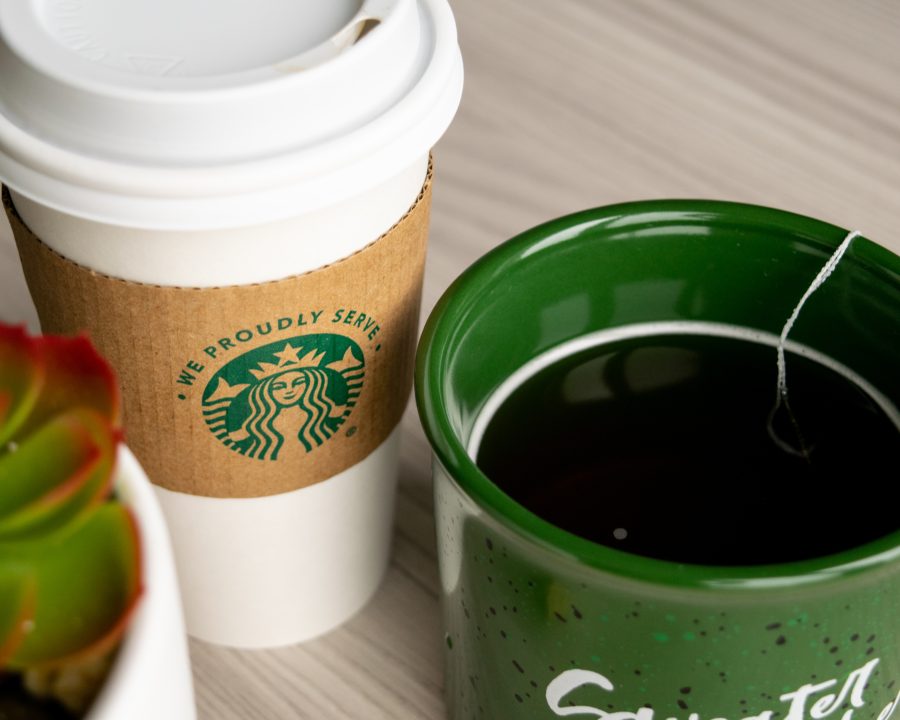If you are a typical college student, you probably run on caffeine. Now that the semester is coming to a close and finals week is approaching, you’re likely reaching for your coffee even more. Now, I am not writing this article to discourage you from drinking coffee ever again. Personally, I still drink it a few times a week despite kicking my daily habit. Rather, I’m here to discuss with you the benefits and disadvantages of coffee and another hot or iced beverage: tea.
Before we begin, it is important to distinguish between herbal and non-herbal teas. Firstly, herbal teas usually do not contain caffeine, while non-herbal teas do. Secondly, herbal teas come in a variety of flavors, allowing you to sip on everything from peach tea to peppermint tea. In contrast, there are only four types of non-herbal teas: black, green, white, and oolong. [1]
Now, assuming you are a student who is trying to maintain a (semi) healthy lifestyle all while grinding out papers, preparing presentations, and studying for exams, you likely have different needs for different situations. Let’s discuss a few of these:
Focus and Productivity:
If you’re looking to focus for a short burst of time, then finding a drink with a lot of caffeine is a very good go-to. Caffeine increases brain activity and makes you feel less tired, [2] and can be found both in coffee and in non-herbal teas.
Coffee has the highest caffeine content, with each cup averaging around 90-100mg [2]. Non-herbal teas usually cap off at around 70mg of caffeine per cup. [1] If you drink a beverage with a large amount of caffeine—like coffee—every day, you are likely to build up a tolerance to caffeine. [2]
So, during these final weeks of the semester, you may be best served to switch to a tea for your go-to baseline beverage, and save the coffee for when you have a big assignment you need to complete. However, if you’ve been consuming large amounts of caffeine for a long time, it’s best to gradually decrease your caffeine intake in order to avoid the nausea, headaches, and irritability that can come with caffeine withdrawal. [3] So, switching from coffee to a caffeinated tea might be a good start—listen to your body, and do what is best for you.
Sleep and Relaxation:
A large part of being a successful student is getting enough time to sleep and relax. Although those times are few in the frenzy of the last few weeks of the semester, what you drink may aid you in finding some calm and catching some zzz’s.
Caffeine is a known sleep disrupter. According to sleepfoundation.org, caffeine can “reduce sleep time, efficiency, and satisfaction levels,” and can lead to insomnia symptoms if over-consumed. [4]
If you’re looking for a more restful night of sleep, stop drinking coffee or caffeinated teas six hours or more before you anticipate going to sleep [4]. Instead, choose an herbal tea to sip on before bed. Chamomile and lavender teas are examples of teas used either to treat insomnia (chamomile) or aid in relaxation and sleep (lavender), that are relatively cheap and easy to find. [5]
Mental Health:
Trying to stay mentally healthy is another task that many college students must juggle at the end of the semester. Drinking herbal teas at the end of the day to relax and sleep, as mentioned before, is a great way to help in this balancing act.
Coffee is sort of a mixed bag when it comes to mental health maintenance. According to healthline.com, coffee drinkers are less likely to become depressed or commit suicide. However, due to its high caffeine content, coffee (and too much non-herbal tea) can cause anxiety and sometimes panic attacks. [2]
In sum, there is really no correct answer as to whether tea or coffee is better for the typical student. Each presents its own benefits and disadvantages in different situations, so it is important to make a judgement about what drink will serve you the best. Please drink responsibly, and enjoy the rest of the semester!
SOURCES:
[1]-https://danettemay.com/actual-tea-vs-herbal-tea-yes-theres-a-difference/
[2]-https://www.healthline.com/nutrition/coffee-good-or-bad#TOC_TITLE_HDR_3
[3]-https://my.clevelandclinic.org/health/articles/15496-caffeine-how-to-hack-it-and-how-to-quit-it
[4]-https://www.sleepfoundation.org/nutrition/caffeine-and-sleep
[5]-https://www.healthline.com/nutrition/teas-that-help-you-sleep#1.-Chamomile





















































